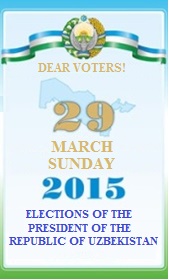 By Ameya Sathaye, Editor-in-Chief, Sarkaritel.com / Diplomacyindia.com in Tashkent
By Ameya Sathaye, Editor-in-Chief, Sarkaritel.com / Diplomacyindia.com in Tashkent
Tashkent, March 27 : Uzbekistan goes to polls Sunday March 29 to elect a new President under a new constitutional law that requires that the highest office of the land be filled 90 days after parliamentary elections are gone through.
Elections to the legislative chamber were held over two rounds, the first on December 23 last year (2014) and the 2nd on January 04 this year (2015).
The four candidates contesting the elections are:
Islam Karimov of the Liberal Democratic Party.
Khatamjan Ketmanov of the People’s Democratic Party.
Nariman Umarov of the Justice Social Democratic Party.
Akmal Saidov of the National Revival Democratic Party.
The Election Commission of Uzbekistan gave the official start to the presidential campaign, approved a program of preparations for the elections and established a republican press center for the election coverage.
On December 21, Uzbekistan held elections to the parliament’s lower house and local legislatures. Some 18.5 million people or 89% of the voters took part in the polls.
Modern technology has been pressed into service by the Election Commission this time with the use of video conferencing with base in Tashkent with all the 12 regions of uzbekistan.
State of the art media center has been created in tashkent to facilitate the local as well as international media to report the events and outcome of the presidential elections.
In Uzbekistan came about 300 representatives of foreign states and international organizations to participate in the election of the President of the Republic of Uzbekistan as observers.
Economy at a Glance
Uzbekistan has since its independent had started a gradual transition to a market-based economy. The economic reforms process was aimed at ensuring social stability alongside substantial economic growth. This approach resulted in considerable achievements, recognized by all major international financial institutions, diplomatic observers indicated.
Uzbek economy has grown by 45 % in the last six years. Industrial production is up 1.6 times, agricultural production by 1.5 times, the foreign trade turnover – 1.7 times. , GOLD and currency reserves – 3.7 times, growth rate of GDP for last four years is at a robust level of 7-8 %, and inflation rate for the last six years has reduced from 26% to 2,9%.
Uzbekistan, a leading industrial country in Central Asia, possesses a highly developed automobile, machine building, textiles, food processing, metallurgy, natural gas and oil processing, chemical and other industries. It is the largest agricultural producer of the region. It is a leading producer and exporter of raw cotton, and, more recently, of cotton yarn and textiles. The country also produces and exports significant quantities of silk, fruits and vegetables, economic stats gathered indicate.
Mining and minerals is a crucial part of the national economy. Uzbekistan is a major producer of GOLD with the largest open-pit gold mine in the world and has substantial deposits of such strategic minerals as copper, lead, zinc, tungsten, and uranium, as well as natural gas and oil.
The country has a highly developed transport infrastructure, of 6,5 thousands km of railways, over 43,5 thousands km of highways and developed air communication network which connects the most remote regions and uninhabited areas of the country to major centers, providing access to international transport systems and basic natural mineral and raw materials resources in the country.
Uzbekistan’s foreign trade policy is based on import substitution. The country’s traditional trade partners are the CIS countries, notably Russia, Ukraine and Kazakhstan, which in aggregate account for over 40% of its exports and imports. Non-CIS partners have been increasing in importance in recent years, with Turkey, China, Iran, South Korea, and the EU being the most active.
Uzbekistan is a member of the IMF, World Bank, Asian Development Bank, and European Bank for Reconstruction and Development. It has observer status at the World Trade Organization, is a member of the World Intellectual Property Organization, and is a signatory to the Convention on Settlement of INVESTMENT Disputes Between States and Nationals of Other States, the Paris Convention for the Protection of Industrial Property, the Madrid Agreement on Trademarks Protection, and the Patent Cooperation Treaty.
Reported by Ameya Sathaye from Tashkent / Written by TN Ashok / Diplomatic Editor at New Delhi